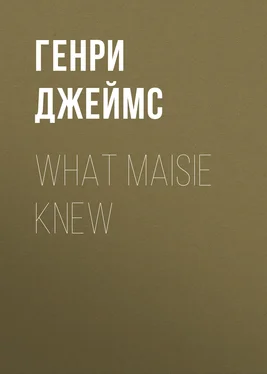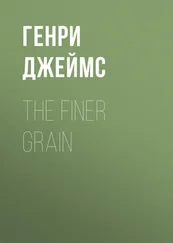Генри Джеймс - What Maisie Knew
Здесь есть возможность читать онлайн «Генри Джеймс - What Maisie Knew» — ознакомительный отрывок электронной книги совершенно бесплатно, а после прочтения отрывка купить полную версию. В некоторых случаях можно слушать аудио, скачать через торрент в формате fb2 и присутствует краткое содержание. Жанр: foreign_children, foreign_antique, foreign_prose, на английском языке. Описание произведения, (предисловие) а так же отзывы посетителей доступны на портале библиотеки ЛибКат.
- Название:What Maisie Knew
- Автор:
- Жанр:
- Год:неизвестен
- ISBN:нет данных
- Рейтинг книги:4 / 5. Голосов: 1
-
Избранное:Добавить в избранное
- Отзывы:
-
Ваша оценка:
- 80
- 1
- 2
- 3
- 4
- 5
What Maisie Knew: краткое содержание, описание и аннотация
Предлагаем к чтению аннотацию, описание, краткое содержание или предисловие (зависит от того, что написал сам автор книги «What Maisie Knew»). Если вы не нашли необходимую информацию о книге — напишите в комментариях, мы постараемся отыскать её.
What Maisie Knew — читать онлайн ознакомительный отрывок
Ниже представлен текст книги, разбитый по страницам. Система сохранения места последней прочитанной страницы, позволяет с удобством читать онлайн бесплатно книгу «What Maisie Knew», без необходимости каждый раз заново искать на чём Вы остановились. Поставьте закладку, и сможете в любой момент перейти на страницу, на которой закончили чтение.
Интервал:
Закладка:
Maisie looked from one of her companions to the other; this was the freshest gayest start she had yet enjoyed, but she had a shy fear of not exactly believing them. "Well, what reason is proper?" she thoughtfully demanded.
"Oh a long-legged stick of a tomboy: there's none so good as that." Her father enjoyed both her drollery and his own and tried again to get possession of her—an effort deprecated by their comrade and leading again to something of a public scuffle. Miss Overmore declared to the child that she had been all the while with good friends; on which Beale Farange went on: "She means good friends of mine, you know—tremendous friends of mine. There has been no end of them about—that I will say for her!" Maisie felt bewildered and was afterwards for some time conscious of a vagueness, just slightly embarrassing, as to the subject of so much amusement and as to where her governess had really been. She didn't feel at all as if she had been seriously told, and no such feeling was supplied by anything that occurred later. Her embarrassment, of a precocious instinctive order, attached itself to the idea that this was another of the matters it was not for her, as her mother used to say, to go into. Therefore, under her father's roof during the time that followed, she made no attempt to clear up her ambiguity by an ingratiating way with housemaids; and it was an odd truth that the ambiguity itself took nothing from the fresh pleasure promised her by renewed contact with Miss Overmore. The confidence looked for by that young lady was of the fine sort that explanation can't improve, and she herself at any rate was a person superior to any confusion. For Maisie moreover concealment had never necessarily seemed deception; she had grown up among things as to which her foremost knowledge was that she was never to ask about them. It was far from new to her that the questions of the small are the peculiar diversion of the great: except the affairs of her doll Lisette there had scarcely ever been anything at her mother's that was explicable with a grave face. Nothing was so easy to her as to send the ladies who gathered there off into shrieks, and she might have practised upon them largely if she had been of a more calculating turn. Everything had something behind it: life was like a long, long corridor with rows of closed doors. She had learned that at these doors it was wise not to knock—this seemed to produce from within such sounds of derision. Little by little, however, she understood more, for it befell that she was enlightened by Lisette's questions, which reproduced the effect of her own upon those for whom she sat in the very darkness of Lisette. Was she not herself convulsed by such innocence? In the presence of it she often imitated the shrieking ladies. There were at any rate things she really couldn't tell even a French doll. She could only pass on her lessons and study to produce on Lisette the impression of having mysteries in her life, wondering the while whether she succeeded in the air of shading off, like her mother, into the unknowable. When the reign of Miss Overmore followed that of Mrs. Wix she took a fresh cue, emulating her governess and bridging over the interval with the simple expectation of trust. Yes, there were matters one couldn't "go into" with a pupil. There were for instance days when, after prolonged absence, Lisette, watching her take off her things, tried hard to discover where she had been. Well, she discovered a little, but never discovered all. There was an occasion when, on her being particularly indiscreet, Maisie replied to her—and precisely about the motive of a disappearance—as she, Maisie, had once been replied to by Mrs. Farange: "Find out for yourself!" She mimicked her mother's sharpness, but she was rather ashamed afterwards, though as to whether of the sharpness or of the mimicry was not quite clear.
VI
She became aware in time that this phase wouldn't have shone by lessons, the care of her education being now only one of the many duties devolving on Miss Overmore; a devolution as to which she was present at various passages between that lady and her father—passages significant, on either side, of dissent and even of displeasure. It was gathered by the child on these occasions that there was something in the situation for which her mother might "come down" on them all, though indeed the remark, always dropped by her father, was greeted on his companion's part with direct contradiction. Such scenes were usually brought to a climax by Miss Overmore's demanding, with more asperity than she applied to any other subject, in what position under the sun such a person as Mrs. Farange would find herself for coming down. As the months went on the little girl's interpretations thickened, and the more effectually that this stretch was the longest she had known without a break. She got used to the idea that her mother, for some reason, was in no hurry to reinstate her: that idea was forcibly expressed by her father whenever Miss Overmore, differing and decided, took him up on the question, which he was always putting forward, of the urgency of sending her to school. For a governess Miss Overmore differed surprisingly; far more for instance than would have entered into the bowed head of Mrs. Wix. She observed to Maisie many times that she was quite conscious of not doing her justice, and that Mr. Farange equally measured and equally lamented this deficiency. The reason of it was that she had mysterious responsibilities that interfered—responsibilities, Miss Overmore intimated, to Mr. Farange himself and to the friendly noisy little house and those who came there. Mr. Farange's remedy for every inconvenience was that the child should be put at school—there were such lots of splendid schools, as everybody knew, at Brighton and all over the place. That, however, Maisie learned, was just what would bring her mother down: from the moment he should delegate to others the housing of his little charge he hadn't a leg to stand on before the law. Didn't he keep her away from her mother precisely because Mrs. Farange was one of these others?
There was also the solution of a second governess, a young person to come in by the day and really do the work; but to this Miss Overmore wouldn't for a moment listen, arguing against it with great public relish and wanting to know from all comers—she put it even to Maisie herself—they didn't see how frightfully it would give her away. "What am I supposed to be at all, don't you see, if I'm not here to look after her?" She was in a false position and so freely and loudly called attention to it that it seemed to become almost a source of glory. The way out of it of course was just to do her plain duty; but that was unfortunately what, with his excessive, his exorbitant demands on her, which every one indeed appeared quite to understand, he practically, he selfishly prevented. Beale Farange, for Miss Overmore, was now never anything but "he," and the house was as full as ever of lively gentlemen with whom, under that designation, she chaffingly talked about him. Maisie meanwhile, as a subject of familiar gossip on what was to be done with her, was left so much to herself that she had hours of wistful thought of the large loose discipline of Mrs. Wix; yet she none the less held it under her father's roof a point of superiority that none of his visitors were ladies. It added to this odd security that she had once heard a gentleman say to him as if it were a great joke and in obvious reference to Miss Overmore: "Hanged if she'll let another woman come near you—hanged if she ever will. She'd let fly a stick at her as they do at a strange cat!" Maisie greatly preferred gentlemen as inmates in spite of their also having their way—louder but sooner over—of laughing out at her. They pulled and pinched, they teased and tickled her; some of them even, as they termed it, shied things at her, and all of them thought it funny to call her by names having no resemblance to her own. The ladies on the other hand addressed her as "You poor pet" and scarcely touched her even to kiss her. But it was of the ladies she was most afraid.
Читать дальшеИнтервал:
Закладка:
Похожие книги на «What Maisie Knew»
Представляем Вашему вниманию похожие книги на «What Maisie Knew» списком для выбора. Мы отобрали схожую по названию и смыслу литературу в надежде предоставить читателям больше вариантов отыскать новые, интересные, ещё непрочитанные произведения.
Обсуждение, отзывы о книге «What Maisie Knew» и просто собственные мнения читателей. Оставьте ваши комментарии, напишите, что Вы думаете о произведении, его смысле или главных героях. Укажите что конкретно понравилось, а что нет, и почему Вы так считаете.












